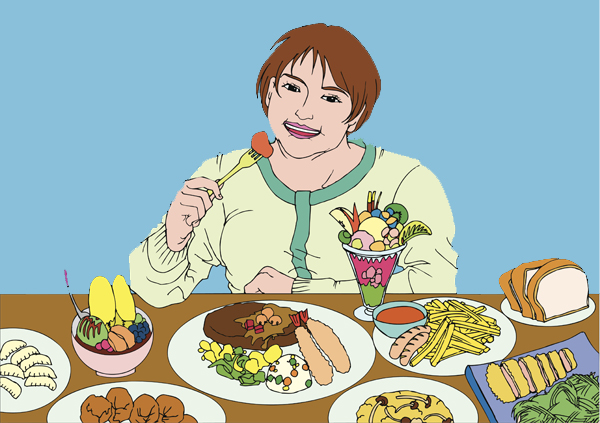According to the World Health Organization, Obesity is having a Body Mass Index of 30 and over. A Non-Communicable Disease (NCD) is known as a chronic disease, not passed from person to person. They are of long duration and generally progresses slowly.
According to a study published in the West Indian Medical Journal that looked at Obesity prevention and the key to non-communicable disease control, the rapid increase in obesity in the Caribbean has been accompanied by increasing mortality in Diabetes and Hypertension. More than 55% of the Caribbean women are overweight and obesed, almost twice as many as men.
“Obesity was once believed to be a problem of abundance, affecting only the rich in society, however now, even the poorest in society are facing the problem of obesity and its consequences,” said study author Dr. FJ Henry, the Director of Caribbean Food and Nutrition Institute (PAHO/WHO).
Henry stated that this problem is due to:
- A shift in diets away from indigenous staples and locally grown fruits and vegetables, to more processed foods and beverages that are high in fats, sugars and sodium.
- Urbanization characterized by predominantly sedentary employment, mechanized transportation and lower levels of recreational physical activity.
- Limited access to preventative healthcare in poor communities.
Close assessment would reveal that most of these causes are attributed to lifestyle practices which are more or less preventable.
The study also revealed that the silent escalating epidemic of obesity is the underlying cause of most deaths in the Caribbean today and that the prevalence of obesity has devastating effects beyond Diabetes and Hypertension as it plays an aetiologic role in several other chronic diseases such as Coronary Heart Disease, Gallbladder disease, Colon Cancer, Breast Cancer and Stroke. The disease burden, he says, increases with increasing obesity.
It also estimated that a 10kg weight loss in obese persons can have a significant impact on their health status yielding a decrease in mortality, blood pressure, lipids and diabetes.
Furthermore, a 10% reduction in body weight can result in a reduction of 1.2-2.9 years of life with hypertension, 0.3-0.8 years with hypercholesterolemia and 0.5-1.7 years with type 2 diabetes.
Some Social Determinants of Health in the Caribbean are:
Lifestyle – due to the “electronic age”, persons tend to have a sedentary lifestyle, becoming more dependent on technology to do the work. The seemingly never ending economic crisis is a driving force behind many persons being stressed, which may encourage injudicious consumption of alcoholic beverages. Excess alcohol consumption can cause weight gain.
Somehow, time spent at the workplace, time spent taking care of the children and the spouse, domestic work, browsing the internet and catching up on our favourite television feature excludes the interest or perhaps the “time” to exercise. It is most often on everybody’s New Year’s resolution list but for some reason we never seem to get around to doing it or perhaps have started but eventually stopped. Whatever happened to walking or cycling these days?
Now than before, the media is playing a very active role in the promotion of foods that are classified as unhealthy because they have high fat and sugar content. I would in fact agree that business is competitive as each fast food restaurant wants to be profitable, hence the advertising of their products. Advertising is indeed good for business, however in so doing, persons are being encouraged towards an unacceptable diet.
Cultural Beliefs and Practices – In many local communities, the elderly especially, believe that if one is not fat he is not healthy or “thriving” or if one looks too slim or looses weight quickly that it is associated with certain disease conditions like HIV/AIDS, so some persons tend to aspire to put on weight in an attempt to dispel such cultural beliefs.
Also, in times past it was the culture of the people in the developing countries to eat the foods that they have planted and reared. Nowadays, many have taken on the culture of the developed world; eating much fast foods, processed and bottled foods and beverages with artificial additives and preservatives that are usually high in fats, sugars and sodium.
Financial Inadequacy – again due to the present economic crisis faced globally, many persons complain of difficulty in providing food and other necessities for living. Hence children and adults alike are consuming foods that are affordable but not necessarily nutritious. Sugar and salt are cheap, thus it is incorporated in many foods to cause them to be tasty. Persons will gravitate to buying these, yielding a resultant increase in weight which leads to obesity and subsequent NCDs.
I’m sure there is more, however this is just a start. When we find the cause of a problem, we have successfully moved in the right direction to solving it, or in this case, managing it.
We all have our part to play in living a happier, healthier life. This problem of Obesity is not new, therefore it is full time that we get up, and get moving on making the necessary lifestyle modifications in order to actively reduce our chances of gaining excess weight which can further lead to NCDs and death.
Photo credit: pixabay.com/thinkstockphotos.com




